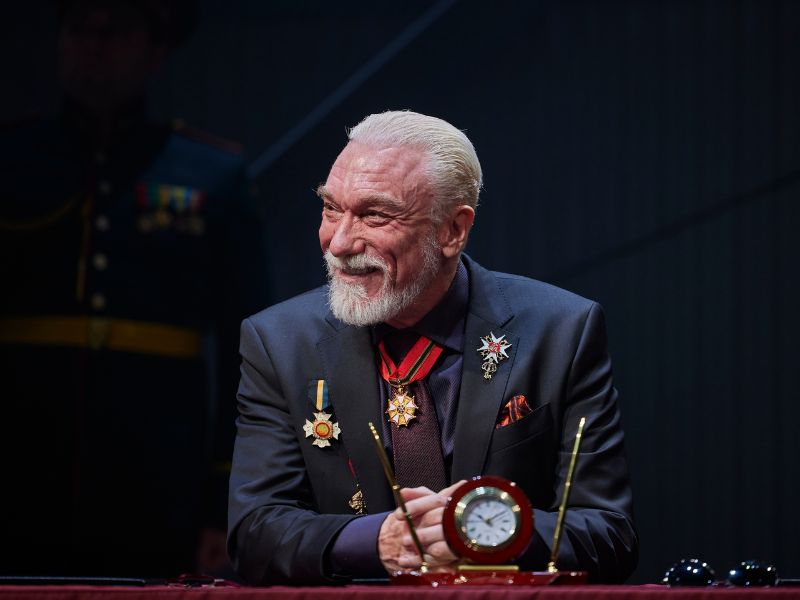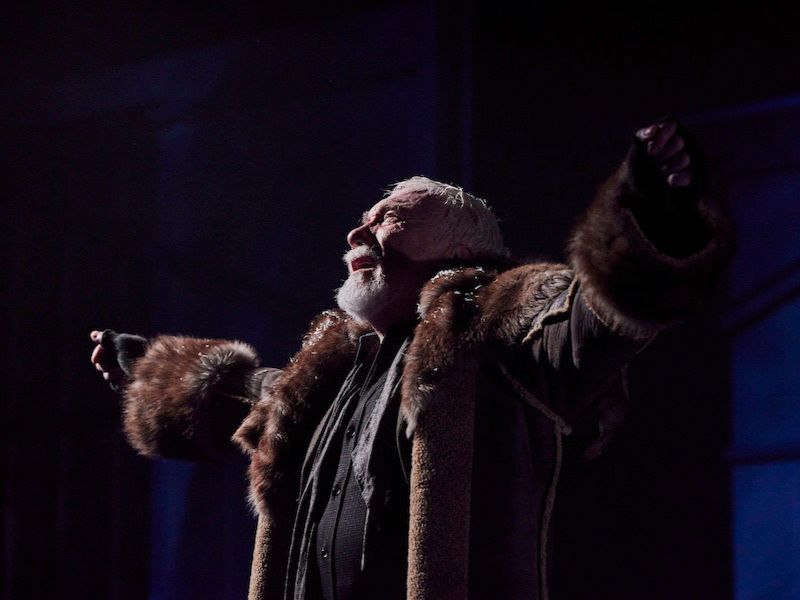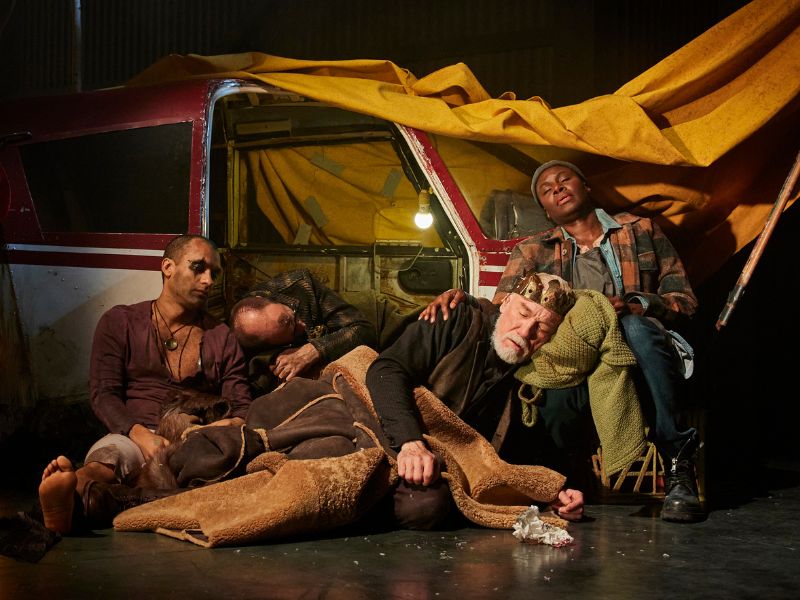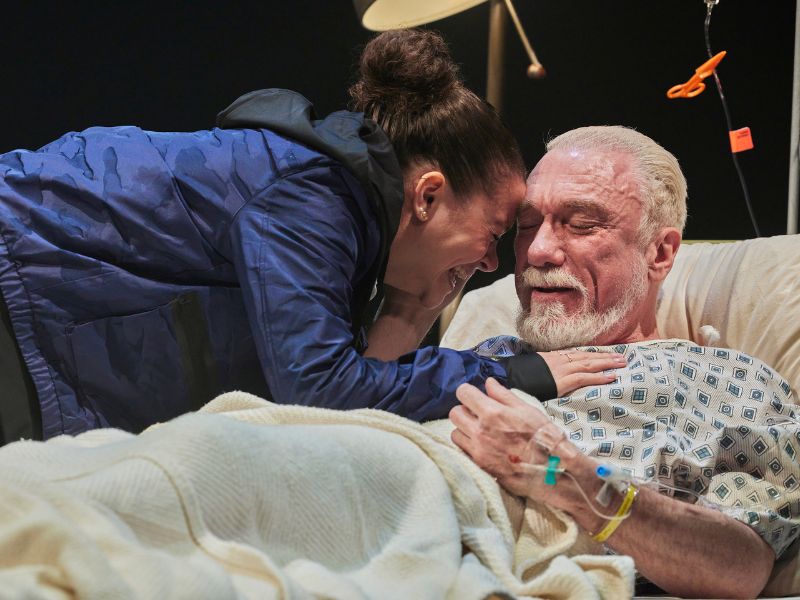Last weekend King Lear broke Shakespeare Theatre Company’s previous one-day ticket-sales record (set by the Broadway-bound musical Once Upon a One More Time). The production, starring Patrick Page, has been extended three times (it must close on April 16). The reviews have been rapturous, especially for Page, an acclaimed Shakespearean actor, who is known for playing Hades in the musical Hadestown on Broadway (and who wrote and performed All the Devils Are Here: How Shakespeare Invented the Villain for STC.)
What is it that is so astonishing about Page’s performance now as King Lear? In posing that question, I was reminded of one of the greatest Shakespearean actors of all time, Edmund Kean (1789–1833). The poet Samuel Taylor Coleridge famously said, “To see him act, is like reading Shakespeare by flashes of lightning.” `

When dividing his kingdom, Page is at first kingly, confident, even jovial. He has majesty, sophistication, and, to his mind, complete control. As Regan (Stephanie Jean Lane) and Goneril (Rosa Gilmore) come to the podium and falsely profess their love for him, he offers a complacent smile, sure of obtaining the outcome he has planned. No one understands him. No one, in his eyes, could approach his mastery of any situation. And yet underneath there is something strangely fragile.
Along with the intensity of his magnificent voice, Page uses movement to ground the violence, humor, and ultimate powerlessness of the king. Rage, fear, despair, and all the passionate emotions are there, burst out, and quickly fade away. His lightning shifts of mood present the indelible image of a soul in torment.
When Lily Santiago’s Cordelia refuses to play along, he explodes. He bangs his fist on the table. In that moment, he becomes terrifying. Before this, he seemed a relatively normal man, although a supremely entitled one. But now, Page captures perfectly the manifold contradictions of the abusive man. Underneath that mask of normality, he could be a monster.

He is a narcissist, of course, and as such the merest hint of opposition causes his mind to shatter. He believes in nothing and no one but himself. Like a druid from another age, he wields enormous power.
There is no doubt that he can be violent. So perhaps Goneril and Regan, as smug as they seem now, were once afraid of him. Perhaps for years they have all had to tread carefully, fearing the consequences of telling him the truth. Or even in the first scene, do they see him as a spent force, ripe for manipulation?
Narcissists, it is said, do not often change. But some of Page’s strongest moments represent the beginning of just such a change. In the famous storm scene, he learns compassion for
Poor naked wretches, wheresoe’er you are,
That bide the pelting of this pitiless storm,
How shall your houseless heads and unfed sides,
Your looped and windowed raggedness defend you
From seasons such as these? O, I have ta’en
Too little care of this. Take physic, pomp.
Expose thyself to feel what wretches feel,
That thou may’st shake the superflux to them
And show the heavens more just
— King Lear, Act 3, Scene 4

At his lowest point, he learns to accept sincere help from others instead of enforced servility. But he never loses his faith in his own royal significance. Even when he has lost everything, a pitiful sight in a hospital gown, he still says of himself “Every inch a king.”

Many actors excel in their portrayals of various aspects of Lear. But Page brings us the whole man, in all his monstrous splendor. Even with all his monumental flaws yet now as king of nothing, he has at last learned to love.
Running Time: Two hours 35 minutes, including one intermission.
EXTENDED: King Lear plays through April 16, 2023, presented by Shakespeare Theatre Company at the Klein Theatre, 450 7th Street NW, Washington, DC. Tickets ($35–$190) may be purchased online or by calling the Box Office at 202-547-1122. Special discounts are available for members of the military, students, seniors, and patrons age 35 and under. Contact the Box Office or visit Shakespearetheatre.org/tickets-and-events/special-offers/ for more information.
The Asides+ program for King Lear, including Shakespeare Theatre Company’s typically excellent dramaturgical material, is available here.
COVID Safety: All performances of King Lear are MASK RECOMMENDED. Detailed Safety and Health information is here.
SEE ALSO:
Shakespeare Theatre delivers a breathtaking ‘King Lear’ (review by Bob Ashby, March 3, 2023)
O villainy! Patrick Page slays in ‘All the Devils Are Here’ from STC (review by Sophia Howes, February 3, 2021)




